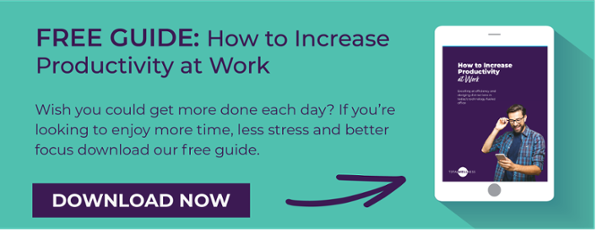 Ah, time.
Ah, time.
The ever-elusive intangible object we can never get enough of on any given day.
While it’s true we all get the same 24 hours in a day, some of us never seem to make the most of those hours. If you find yourself rushing between tasks or always running behind, it may be time to re-evaluate how you tackle your day.
Luckily, there are effective time management strategies that anyone can implement, including planning ahead, setting goals correctly, and getting organized.
Below, we offer insight into how to best manage time in a way that leads to a lot less stress!
Who Wouldn’t Love More Time?
There are 24 hours in a day. That’s 1,440 minutes every day.
How are you using your minutes?
Plenty of people complain there’s not enough time to get everything done, but we all have the same amount of time. So how do pro athletes, business people, and truly successful people keep their lives on track?
By learning how to most effectively run their day in a way that makes sense to them.
If you find yourself struggling with getting priority projects done, it’s probably due to lack of time management. When you nail down the art of timing, you can control your life better.
Easy Time Management Strategies to Start Using Today
There are easy ways to identify your biggest “time suckers” and apply time management strategies to be more efficient at work. But it only benefits those who take the time to uncover these time wasters. Employees with poor time management are more likely to be stressed and inefficient, which builds a self-perpetuating loop of never getting tasks done.
The following effective time management techniques can help in both professional and personal lives:
Track Time
This will help you truly see which tasks are taking up too much time. Then you can create a game plan of how to better use your time by using other techniques like lists or apps.
How to do it:
- Record a week of your activities to uncover time wasters
- Use a spreadsheet or an online calendar
- Track to 15-minute intervals if you can
Biggest benefit:It identifies your weaknesses to find ways to improve.
Make a List
A good old-fashioned list can make it easy to zero in on priority projects or tasks. Break your list into high, medium, and low priority tasks. Doing so also makes it easier to see what can be delegated or postponed.
Why make a list?
- Helps prioritize tasks to stay on track
- Gives you a road map for your day
- Breaks larger projects down into smaller, manageable pieces
- Marking tasks as done is satisfying
Biggest benefit: It’s simple and super effective.
Use Apps
By using free apps for yourself or your team, you can all save time and put that energy elsewhere. A few of the most useful apps for work environments:
- Asana and Trello are both project management apps that can be used individually or for teams.
- Evernote keeps track of notes, memos, to-do lists, images, meetings.
- Grammarly saves time in editing documents and helps catch spelling mistakes.
- Toggl is a free timer that lets you classify your time by clients, projects, and other options.
Biggest benefit: Some of the most useful apps are free, and it can go with you anywhere you take your phone.
Take a Break
Sometimes the mind and body need a break, especially if you’ve been at a task for hours on end. Taking breaks is important to avoid overall fatigue both mentally and physically.
Break benefits include:
- Increases productivity
- Refreshes the body and brain
- Can help get you “unstuck” when solving problems
- Interacting with co-workers can improve your mood and reduce stress
Biggest benefit: Taking a much-needed break can help you come back with a refreshed mind and attitude to tackle a task.
Don’t Multitask
For a majority of the population, effective multitasking is a myth. Imagine trying to do two very different tasks while putting 100% effort in for both. It’s likely you won’t do both well. You’ll waste more time trying to switch back and forth between projects.
Here’s why you shouldn’t multitask:
- The brain needs time to switch between tasks
- Do one thing at a time until it’s done and then move on the next
- It can introduce errors if you rush tasks
Biggest benefit: You’ll end up doing projects or tasks more efficiently and thoroughly when you focus on one at a time.
Learn to Ask For Help and How to Say No
If you know someone that knows a short answer that is going to take you 30 minutes to find on Google, just ask. Or, if you’re the “go-to” person too often, you can say no, especially if you have coworkers who expect you to do their work. You can send them some pointers or thoughts, but your deadlines are your priority.
Why asking for help and saying no works:
- Can build relationships and a feeling of teamwork
- Others may feel a sense of purpose by helping out
- Asking for help can reduce anxiety around big projects
- Build up confidence by only taking on what you can
Biggest benefit: Delegation builds communication and leadership skills. Learning to say no can build confidence for people who are used to taking on too much.
Organize Your Day the Night Before
Being more organized means you’re less rushed and you start your day off with less stress, setting you up for a better day all around.
Bring your mornings to order by doing these basic tasks:
- Start your day off knowing what you’re wearing
- Grab your already packed lunch
- Know exactly where your keys hang
- Have your laptop/briefcase/work papers ready to go
Biggest benefit: Your day will start off peacefully instead of chaotically.
Time is of the Essence
Not everyone has amazing time management skills. Sometimes, stress and time management go hand-in-hand. Help your employees learn the best time management skills for their personality.
Time management at work doesn’t have to be complicated. But it may take some time to figure out which styles work best for individuals.
When you empower employees to implement time management strategies, it will improve productivity and reduce stress for individuals and teams. Eventually, effective time management tools helps projects and other work processes run like well-oiled machines!
Now, go on. Time is ticking. Share this list of time management tools with your team today!
What time management strategies or tools do you use in your office? Share in the comments below!



